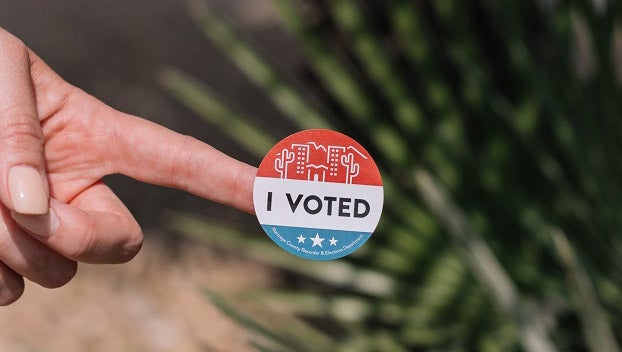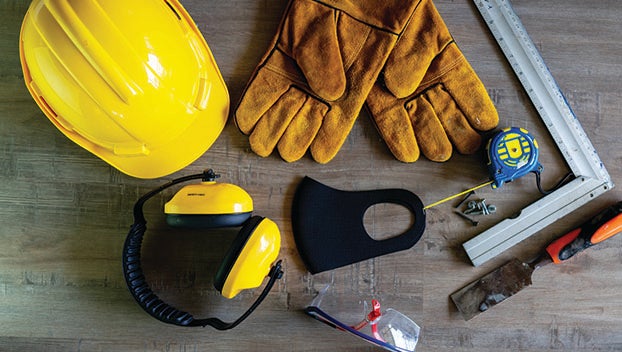Workshop focuses on compressor station
Published 4:45 pm Tuesday, February 23, 2016

- Charles White, who lives in the vicinity of the proposed 41,000-horsepower compressor station, points to his home on a Dominion map during the work session.
Landowners impacted by the proposed Atlantic Coast Pipeline (ACP), protesters, proponents of the project and numerous interested Buckingham citizens attended Dominion’s Public Information Work Session at the county’s middle school Thursday.
The workshop focused mainly on the proposed 41,000 gas-fired compressor station, slated to be built between Union Hill and Shelton Store roads on Route 56 in northwestern Buckingham. The station-based workshop also focused on numerous aspects of the 42-inch pipeline slated to span Buckingham, such as construction, environmental affairs, and other specifics of the project.
Friends of Buckingham (FOB), a group opposed to the project, protested the meeting both outside of the school and inside the building.
ACP LLC, being led by Dominion, is proposing that a 550-mile natural gas pipeline
be built through West Virginia, Virginia and North Carolina. The pipeline would span Buckingham, Cumberland and Prince Edward counties.
“Tonight’s meeting is actually the culmination of several meetings we’ve had with the community advisory (group),” said Aaron Ruby, a Dominion spokesman. “This was a group that we put together to gather feedback from different people in the community about any suggestions, input they had on what the compressor station ought to look like, techniques we can use to help it blend in (with) the look and feel of the community … Tonight, we’re both presenting information to folks in the community in general about the Buckingham compressor station. We’re also providing general project information, but, we’re also here to talk about what has been the outcome of the community advisory group.”
In addition to the protestors with FOB, about 10 students with the Virginia Student Environmental Coalition attended the meeting.
“Ways we could design the facility that would further minimize the kind of visual and impacts of the facility on the community,” Ruby said of the broad outcomes of the Proposed Compressor Station Community Advisory Group, which met three times. “Ways that we could further minimize any noise that comes from the facility.”
“We’ve added additional sound muffling and equipment to the design of the facility to further minimize the noise,” he said. “We’ve also added additional natural buffers, basically additional landscape, such as trees on the kind of boundary of the site to minimize visibility. And, also again, kind of minimizing the amount of noise that’s audible from the road and adjacent properties.”
Several maps were on display so landowners could see how their land could be impacted by the project.
“It’s designed to really facilitate one-on-one communications between people in the community, landowners and project team members who are dedicated to that specific area in that station,” he said of the meeting. “It’s the best way to have one-on-one dialogue, meaningful substantive dialogue.”
Steve Martin, who lives on U.S. Route 60 in Cumberland at the Buckingham County line, attended the workshop. Though he’s not being directly affected, he supports the project.
“I own mineral rights in West Virginia where this gas is coming out of,” he said, referencing the Marcellus shale field where the gas for the ACP would be fracked.
“I think it’s good,” he said of the project. “The Lord put this stuff down here, the coal, the gas, for us to use. He didn’t put it there for nothing … Why not use it?”
For years, Martin said he lived two miles from a compressor station in West Virginia. “This one will be quieter they tell me because of the pumps and all (are) made up different.”
“I think that this event is about designing a compressor station and it’s kind of like designing something that’s going to destroy your neighborhood,” said Chad Oba, chair of FOB, who lives near the proposed compressor station. “So, that, from the very get go, is offensive. There’s not any real information that we’re going to get here, unless we know what questions to ask.”
FOB’s concerns are the effects on health, property rights and cultural and historical environments of the area, she said.
“These are the things we’re concerned about. We don’t care about the color of the compressor station. It’s offensive to even think that we would want to have any part in designing something that’s going to destroy our lives as we know them.”
Oba said many questions weren’t answered during the advisory group meetings.
“Our questions weren’t answered. The audience, their questions weren’t answered … It didn’t address any of our concerns at all.”





